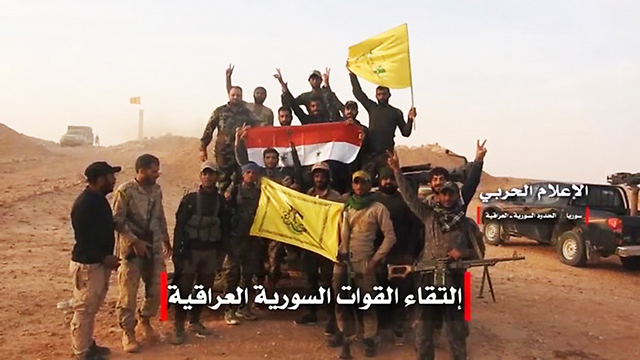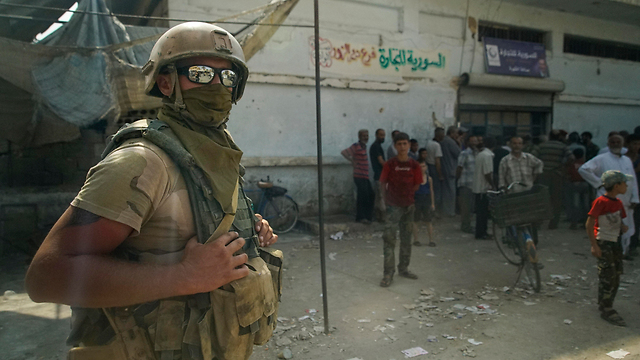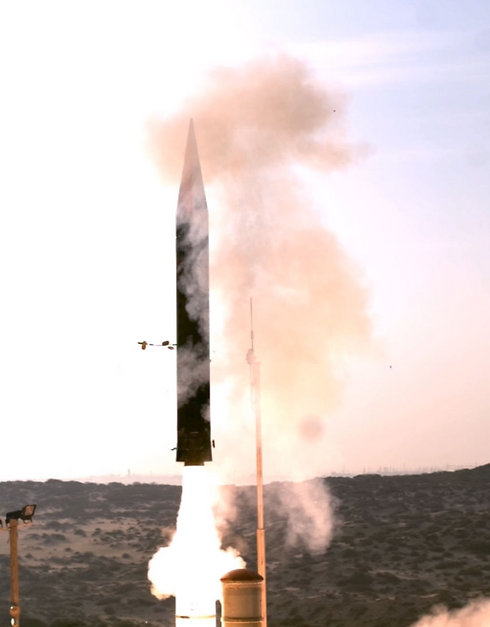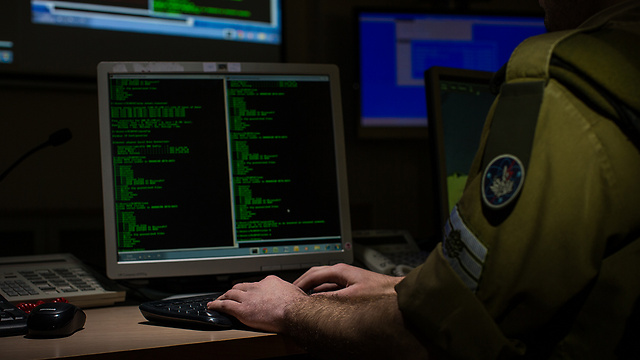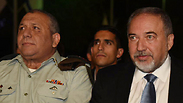

Iranian axis threat that led Lieberman to seek increased IDF budget
Analysis: Defense Minister Lieberman's efforts to increase IDF's budget stem from recent developments in the Middle East, including accurate missiles with larger warheads aimed at Israel from Syria and Lebanon, Iranian entrenchment in the region, and Russian presence in Syria complicating matters.
The demand from the Ministry of Defense and Minister Avigdor Lieberman for additional budgeting is only the tip of the iceberg, the top of which pokes out on occasion in the media and in the political arena. The iceberg itself is change—for the worse—in the threat the Israeli home front faces in case war breaks out on the northern border.
While the defense establishment estimates the Iranians and their proxies, Hezbollah and Syria, can cause a far greater loss of life and material damages to the Israeli civilian and military home front than they could mere years ago, with the worst still yet to come.
In two or three years' time, threats to the home front will become graver. The main reason for this eventuality is not the increase in the number of rockets, missiles and mortars Iran and its satellites may rain on Israel, but rather the deadly effectiveness of such an attack, far more precise than ever before, and hitting Israel on two fronts: the Lebanese and Syrian ones. As a result, casualties—both civilian and military—may increase by hundreds of percents.
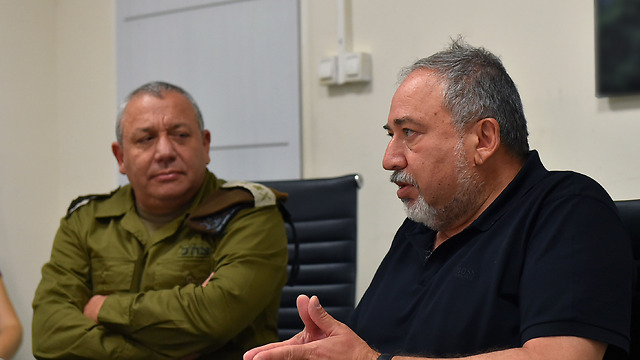
This would appear to be the main catalyst for Lieberman's request to supplement his ministry's budget with billions of shekels more.
Lieberman's request to break out of the confines of the defense budget is the minister's first major independent initiative since he was appointed in May 2016.
While IDF Chief of Staff Gadi Eisenkot and top army brass are not opposed to the move, they have thus far offered only halfhearted support for it publically. Senior army officials concur with Lieberman and the ministry's officials on the gravity of the new potential threat the Iranian axis poses to the home front. Indeed, the estimate was originally put together by the IDF's Military Intelligence Directorate and Planning Directorate.
However, the top army brass believes the IDF already possesses the means and the methods to tackle the worsening northern threat head-on, and it would therefore be imprudent and unjustified to undercut the budgetary equilibrium struck by the IDF thanks to the Gideon multiyear plan, which was achieved after exhausting negotiations between the finance minister and Lieberman's predecessor Moshe Ya'alon.
Motivating the requested NIS 3.8 billion (net) increase to the defense budget are three strategic developments that came into force in the past two years, which adversely affect the country's security standing.
The first development is the so-called "precision revolution," which the Iranians and their proxies attempt to inject into their munitions component. Instead of "static fire" based on a large number of missiles, rockets, artillery shells and mortars—a large portion of which will either hit low-value targets or miss their mark completely—the Iranian axis is moving on a smaller arsenal of munitions of different types, all of which are calibrated to hit high-value targets.
Either direct hits or hit landing within several meters of a relatively small number of "quality targets" will inflict casualties and damages of a strategic military or functional civilian nature far, far graver than the thousands of imprecise missiles and rockets (representing "static fire") lobbed by Hezbollah at Israel during the Second Lebanon War, for instance.
Simultaneously with improving the projectiles' precision using GPS and other means, Iranian military industries are also hard at work to increase their warheads and range.
Adding hundreds of kilograms more of conventional explosives to a rocket or missile's warhead increases its destructive potential and number of losses it can cause with a direct hit. Increasing the range then enables to move rocket launch pads further back in Syria and Lebanon—and even Iran—to areas the Israeli Air Force will be hard pressed to attack.
Difficulties faced by the IDF
The second strategic development we've witnessed is the Syrian theater, recently (re)appearing in Israel's northern front. Should Iran make good on even some of its intentions to increase its foothold in the war-torn country, the next war will probably display a coordinated, cohesive action by Iranian, Syrian and Lebanese firing forces operating against Israel from the northwest in Syria and north in Lebanon.
These firing forces will not be many, but they will be more precise. This effectively means the IDF will have to split its main offensive effort in twain. Instead of a focused, simultaneous effort hitting all of Lebanon from the air, ground and sea to paralyze or suppress projectiles lobbed by Hezbollah at Israel, the army's command will have to send the air force and maneuvering land divisions to attack not just in Lebanon but also in Syria.
Such an attack will also be waged not merely at Hezbollah—now attacking on two fronts—but also at the Syrian army and whichever forces Iran stations in Syria. All of the aforementioned forces will come together—according to Iran's strategic vision—to rain precise fire on central Tel Aviv and the Kirya army headquarters base, the Haifa oil refineries and ammonia tank, as well as many more "quality targets" on the Israeli home front.
The third strategic development to hamper our ability to defend ourselves is the Russian military presence in Syria. Without going into too much detail, it may be said Russian boots on the ground limit the air force's abilities as far as neutralizing projectile launch pads in Syria and Lebanon is concerned.
The air force will now have to consider Russian radars and antiaircraft batteries already stationed in Syria, as well as cutting edge antiaircraft missiles—such as the SA-22—Russia has already sold to the Syrian and Iranian armies and will assist them in operating, it may be reasonably assumed.
It's entirely possible access to some far-off targets of long-range missile launch pads in Syria will be blocked off due to Russian measures capable of forewarning the Syrians and Iranians, which means Israeli aircrafts will need to fly longer and more dangerous routes to reach their targets. Israel will find it hard, for example, to attack military air bases or sites where Russian army personnel are present—Putin does not appreciate his men being in harm's way.
The bottom line is that in the not-too-distant future, the IDF will find it difficult to powerfully and efficiently mount the offensive operational plans on land, sea and air with the intention of paralyzing or substantially reducing casualties and damage inflicted by Hezbollah, Iran and Syria on the Israeli home front.
What should be done?
The conclusion is self-evident, then: the Israeli home front is in dire need of added protection and shielding. Active rocket and missiles defenses developed in Israel have proven to be immensely successful. It's unparalleled in the world when it comes to successful interception. This is, therefore, the first item that needs boosting in light of the escalating threat.
If Israel's enemies already possess several hundreds precise missiles and heavy rockets, it would be fair to assume there will eventually be hundreds such projectils aimed at Israel.
Based on the above assumption, the number of intercepting missiles carried by the IDF's missile-defense systems must be increased, especially as it pertains to missiles carried by the David's Sling system and the Arrow 2 and 3 missiles intended to handle heavy rockets and precise ballistic missiles.
Why? Because more precise Iranian, Syrian and Hezbollah rockets and missiles will almost certainly find their mark, and David's Sling and Arrow batteries will therefore be required to launch more than one interceptor at each missiles fired to ensure a hit. That will cost money, true, but the damage each precise Iranian projectile can inflict on a quality Israeli civilian or military target will be far more costly, without even going into casualties.
Another implement that needs to be purchased and whose price only soars is precise and sophisticated armaments, remotely-operated aircrafts and other intelligence systems for the air force, all of which will allow it to handle the number of targets it will be required to hit in far-flung environs, hampered as it is by the Russian military presence and the building up of the Syrian-Iranian antiaircraft arsenal.
In addition, Israel must consider the possibility that when such fire is aimed at our home front, the air force will not be able to operate at full force for different reasons, whether due to inclement weather conditions or because the Russians and Iranians pull some kind of rabbit out of their hats.
The IDF's ground-based fire deployment must be endowed with the same precise destructive capabilities possessed by the air force. That is, precise medium- and long-range missiles and rockets with relatively heavy payloads.
Lastly, the army must double its capabilities to plan and carry out cyber-based attacks.
Defense Minister Lieberman, IDF chief Eisenkot, and other senior army officials all concur on the necessity of the above measures. But since this threat to the home front is still in the future—grave though it may be, it is still considered potential—the IDF believes the necessary procurement may be spread out over a year or two with the bulk of expenses absorbed by the current defense budget.
The army further maintains that budgetary stability—so difficultly won—is an important asset in effective, orderly building (one planned for years in advance) of the IDF's powers. The budgetary system's basic elements of stability, then, should not be thrown out of order.
Lieberman, on the other end, says he favors an improved home front defense in the present over the uncertainty of the IDF's offensive plans and other capabilities developed as part of the Gideon multiyear plan.
The minister of defense is thus seeking additional budgets, and it's certainly easy to see why. As a high ranking political official, he must first and foremost ensure civilians and home front functioning are done minimal harm, even at the expense of the otherwise worthy principle of endowing the army with years' long budgetary stability.














